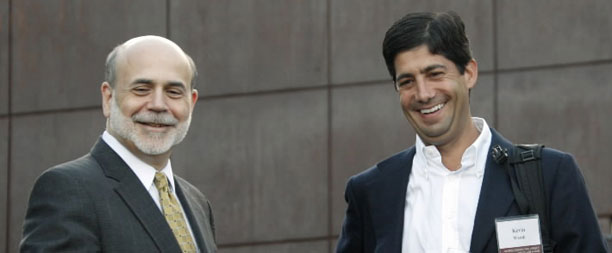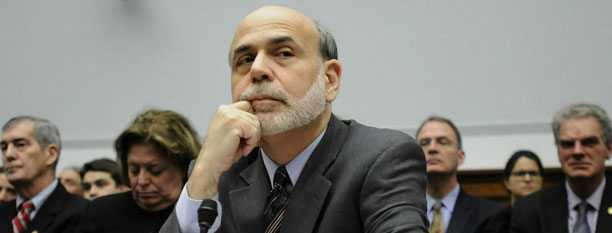Some of the largest U.S. banks will be notified on Friday whether they passed a second round of stress tests conducted by the Federal Reserve, the Wall Street Journal reported on Thursday. Get the full story »
Inside these posts: Bernanke
Visit our Filed page for categories. To browse by specific topic, see our Inside page. For a list of companies covered on this site, visit our Companies page.
Bernanke talk on jobs, prices weigh on dollar
The dollar lost ground Wednesday after a speech by Federal Reserve Chairman Ben Bernanke suggested that the central bank will keep interest rates at record lows and continue its $600 billion bond purchases. Get the full story »
Bernanke says job growth, inflation still too low
U.S. unemployment remains too high despite increasing signs of economic strength, Federal Reserve Chairman Ben Bernanke told Congress on Wednesday, suggesting the central bank would push on with its $600 billion stimulus program. Get the full story »
Risk taking, lax oversight cited for financial crisis
The Financial Crisis Inquiry Commission has concluded that the 2008 financial crisis in the U.S. was caused by a combination of corporate errors, regulatory failure and excessive risk-taking by Wall Street firms, the New York Times reported online Tuesday. Get the full story »
Bernanke: It will take years for jobs to come back
Federal Reserve Chairman Ben Bernanke sketched a more optimistic outlook for the economy, but said a $600 billion bond-buying program is needed because it will take up to five more years to bring unemployment back to healthy levels. Get the full story »
Fed’s Bernanke did not rule out more bond buys
Federal Reserve Chairman Ben Bernanke did not rule out further purchases of Treasury bonds beyond the $600 billion program announced last month, CBS television reported Bernanke as saying in an interview on the show “60 Minutes”. Get the full story »
CBS: Bernanke to appear on ‘60 Minutes’ Sunday
U.S. Federal Reserve Chairman Ben Bernanke will appear on the news program “60 minutes” on Sunday, part of an effort by the central bank to step up its public communications.
The move comes as the Fed’s decision last month to purchase an additional $600 billion caused a flurry of criticism from politicians in Washington, who argue the central bank is playing with fire and courting future inflation. Get the full story »
Bernanke briefs senators on bond buying
Federal Reserve Chairman Ben Bernanke was briefing members of the Senate Banking Committee late Wednesday morning on the central bank’s controversial bond-buying plan, congressional aides said.
The U.S. central bank’s early November decision to launch a second round of large-scale asset purchases has led to a political backlash from Republicans who argue it is setting the ground for inflation and debasing the dollar. Get the full story »
Fed official raises doubts over new Fed program

Fed governor Kevin Warsh, right, with Fed Chairman Ben Bernanke on Aug. 27, 2010. Warsh expressed doubts on Monday about the Fed's $600 billion bond-buying plan. (AP Photo/Reed Saxon)
A Federal Reserve official with a close working relationship with Chairman Ben Bernanke is expressing skepticism over the Fed’s new $600 billion program to bolster the economy.
Kevin Warsh, a Fed governor, warns that there are “significant risks” associated with the Fed’s bond-buying program, including the potential for triggering inflation.
The Fed’s program, announced last week, is aimed getting Americans to spend more and invigorate the economy by making loans cheaper. But Warsh doubts the program will have “significant” or “durable benefits” for the economy. Despite his reservations, Warsh voted for the program. Get the full story »
Bernanke defends Fed from global critics
Federal Reserve Chairman Ben Bernanke on Friday defended the U.S. central bank’s bond-buying against beggar-thy-neighbor criticism, saying it was “critical” for global stability that the U.S. economy regain its strength.
Doing so, he suggested, would bolster a dollar whose weakness has sparked cries of foul from Bogota to Beijing.
The U.S. central bank’s decision to buy $600 billion of government debt has drawn scathing comments from a host of nations who contend it is generating global instability by ramping up their currencies against the dollar, inflating asset bubbles and stoking inflation in their economies. Get the full story »
Fed seen buying up to $100 billion in assets a month
Most leading economists expect the Federal Reserve to buy between $80 billion and $100 billion worth of assets per month under a new program to bolster the struggling economy, a Reuters poll found on Wednesday.
Estimates for how long the Fed will print money and how much it will eventually spend varied widely, from $250 billion to as high as $2 trillion.
In a similar Reuters poll of primary dealers conducted on October 8, dealers mostly forecast the total size of the new program at $500 billion to $1.5 trillion. Get the full story »
Bernanke: Fed moves are boosting economy
The Federal Reserve’s asset purchases lowered borrowing costs and helped the economy, and more buying could further ease financial conditions, Federal Reserve Chairman Ben Bernanke said on Monday.
“I don’t have a number to give you, but I do think that the additional purchases, although we don’t have precise numbers, have the ability to ease financial conditions,” Bernanke said. Get the full story »
Fed must do its part for economy, Bernanke says
Federal Reserve Chairman Ben Bernanke said on Thursday the U.S. economic recovery remains disappointingly slow with unemployment too high.
The Fed has a role to play in returning the economy health, he told teachers at a town-hall event.
“We certainly have in the near term and the medium term…some very difficult challenges,” he said. Get the full story »
Bernanke: Policy has not delivered robust recovery
Federal Reserve Chairman Ben Bernanke acknowledged the economics profession has a lot to answer for after the financial crisis of 2007-2009, including why economists have been unable so far to engineer a healthy recovery. Get the full story »
Bernanke: Fed will act if economy falters
Federal Reserve Chairman Ben Bernanke said Friday that the Fed will consider making another large-scale purchase of securities if the slowing economy were to deteriorate significantly and signs of deflation were to flare.





